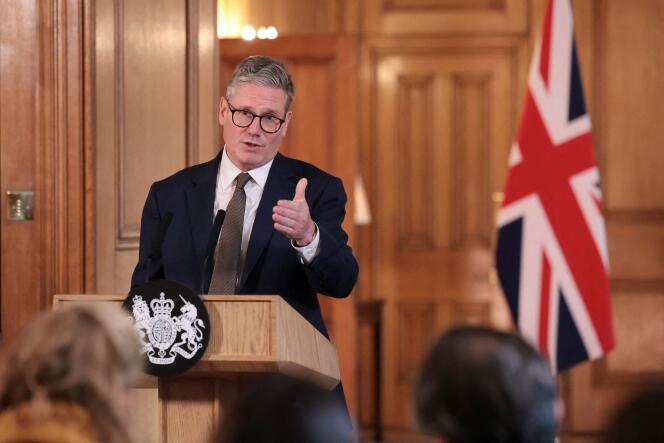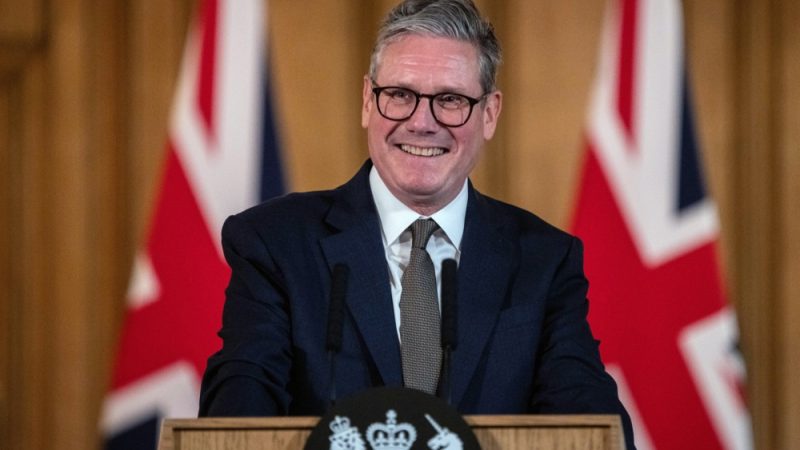Keir Starmer Announces Commitment to Public Service in First Address
In his maiden address, Keir Starmer, the newly elected Labour Party leader, pledged unwavering commitment to public service. Starmer, who has been a vocal advocate for social justice, emphasized the importance of prioritizing the needs of the people over partisan politics. His speech reflected a strong dedication to democratic values, equality, and transparency in governance. He highlighted his belief in a fair society, where opportunities are available to everyone, regardless of their backgrounds.
Starmer’s commitment to public service was further affirmed through his promise to champion policies that protect the rights of workers, improve healthcare, and bolster education systems. He also emphasized the importance of swift and efficient action on climate change. His address was marked by a sense of urgency to restore public faith in government, to ensure that it functions effectively for the benefit of all citizens.
A key part of Starmer’s commitment is his aim to unite the country, by working collaboratively with all sections of society, in a bid to address the challenges facing the nation. His commitment to public service is seen as a crucial aspect of his leadership, signaling a new era of political responsibility and accountability.

Starmer’s Vision for a Service-Oriented Government
Sir Keir Starmer, the leader of the UK’s Labour Party, has a specific vision for a service-oriented government. His approach emphasizes the importance of public services and seeks to ensure that the government serves the needs of its citizens effectively and efficiently. Starmer believes in a government that prioritizes the well-being of its people above all else. In his vision, the government would be more responsive to the needs of its citizens, providing essential services in a timely and efficient manner.
This would include everything from healthcare and education, to public transportation and social care. Starmer’s vision also focuses on ensuring that public services are easily accessible to everyone, regardless of their socioeconomic background. He believes that everyone should have equal access to services and opportunities, and he sees a service-oriented government as a means to achieving this. Furthermore, Starmer’s vision recognizes the importance of the public sector in providing these services.
He advocates for a well-funded and well-supported public sector, arguing that this is crucial for delivering quality services to the people. In this vision, the role of the government is to support and empower its citizens, rather than to control or limit them. By focusing on service provision, Starmer hopes to build a government that is more in touch with the needs of its people, and more capable of meeting those needs effectively.
Key Points from Starmer’s Inaugural Speech
In his inaugural speech, Keir Starmer, the leader of the Labour Party, discussed several key points that outlined his vision for the party and the UK. Foremost among these was a renewed commitment to the principles of social justice, equality, and unity. He emphasized the importance of radicalism in addressing the challenges that the nation faces, acknowledging that the status quo is not sufficient. Starmer also stressed the need for the Labour Party to win back the trust of the British people, promising to listen and learn from past mistakes.
He asserted his commitment to rebuilding strong links with communities, trade unions, and businesses to ensure a more inclusive and effective strategy. In addition, Starmer highlighted the urgency of climate change, pledging to make environmental concerns a top priority in his leadership. He also addressed the issue of Brexit, stating that while he accepted the decision, he would hold the government accountable for the promises made during the campaign.
Lastly, he underlined the need for a strong, competent, and compassionate public health system, particularly in light of the current global health crisis, with a promise to fight for better funding and support. His speech was a clear declaration of his intentions to lead with courage, integrity, and a firm commitment to the values of the Labour Party.

Public Reaction to Starmer’s Promises
Public response to Keir Starmer’s pledges has been a mix of approval, skepticism and indifference. Many supporters of the Labour Party have welcomed Starmer’s promises, viewing them as a refreshing shift from the more radical policy proposals of his predecessor, Jeremy Corbyn. They believe that his commitment to a more centrist agenda might be the key to the party’s success in future elections. Detractors, however, have criticized Starmer’s pledges, particularly his promise of unity, as being too idealistic and lacking substance.
They argue that the Labour leader’s plans are too vague and fail to address the deep-seated issues facing the country, such as economic inequality and Brexit. Some have also accused him of pandering to both the left and right factions of his party in an attempt to maintain unity, thereby diluting his policy agenda.
A significant portion of the public remains indifferent or unsure about Starmer’s promises. They are waiting to see if he can deliver on his pledges and provide the strong leadership that many believe the Labour Party has been missing in recent years. This group is particularly crucial, as their support or opposition could sway the balance of public opinion towards or against Starmer.
Implications for Future Government Policies
The implications for future government policies hinge on a multitude of factors, including shifting social attitudes, emerging technologies, and evolving economic conditions. As societies evolve, so too does the need for policies that reflect these changes. For instance, the rise of artificial intelligence and automation presents challenges that require innovative policy responses to regulate these sectors, without hindering innovation or economic growth.
Similarly, the increasing urgency of climate change calls for comprehensive environmental policies that balance ecological preservation with economic development. The ageing population also necessitates revisions in healthcare and social security policies to ensure that these systems remain sustainable and effective. Such policy changes, however, must be carefully managed to avoid unintended consequences. For example, overly restrictive regulations on AI and automation could stifle innovation and competitiveness, while overly ambitious environmental policies could burden businesses and slow economic growth. Similarly, hastily implemented social security reforms could lead to unintended inequities and inefficiencies.
Therefore, future government policies must be guided by a careful analysis of the potential benefits and trade-offs, informed by sound evidence and broad consultation. Moreover, these policies should be flexible and adaptable, capable of responding to unforeseen developments or changes in circumstances. Ultimately, the implications for future government policies underscore the need for a forward-thinking and balanced approach to governance, one that is capable of navigating the complexities and uncertainties of the 21st century.

Analysis of Starmer’s Policy Priorities
Keir Starmer, the current leader of the Labour Party, has established several policy priorities that reflect a shift towards a more centrist political narrative. His primary focus is on economic recovery and job creation in the wake of the pandemic. His “Jobs Promise” initiative ensures that every young person who has been unemployed for six months will be offered a quality employment opportunity. He also prioritizes investing in the NHS as a key pillar of his policy, pledging to reduce waiting times and increase funding.
Starmer has also emphasized creating a greener economy, making commitments towards achieving net-zero carbon emissions by 2030. Furthermore, he seeks to address social inequality through policies aimed at wealth redistribution and creating a fairer tax system. Despite these progressive pledges, he has drawn criticism for his perceived lack of stance on several controversial issues, such as Brexit and Scotland’s independence. His approach seems to avoid polarizing topics, aiming for a broad appeal rather than addressing specific ideological divides. However, it remains to be seen whether this strategy will resonate with voters and translate into electoral success.
